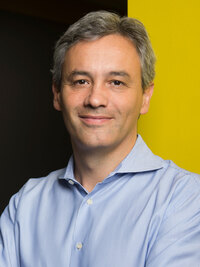Keynote speeches
Tommaso Melodia
William Lincoln Smith Professor at Northeastern University
Toward Fully Programmable, AI-driven, and Virtualized NextG Cellular Networks
Abstract: This talk will present an overview of our work on laying the basic design principles for new approaches to programmable, AI-driven, and virtualized next-generation wireless networks. We will cover three four research thrusts, namely architectures, programmability, slicing, and experimental testbeds. First, we will introduce the building principles of end-to-end fully virtualized cellular wireless networks, and discuss architectural alternatives and options. We will also discuss the main recent developments within the leading open-source alliances. Then, we will talk about programmability, or how to develop abstractions and algorithms to automatically control resources in an end-to-end environment. In this context, we will discuss our prior work on developing CellOS, a new Cellular Operating System. The third part of the talk will focus on the role of network slicing, and on recently developed algorithmic and architectural frameworks to provide optimally sized, isolated slices on virtualized infrastructures with differentiated SLAs in terms of performance and security. Last, we will discuss the state of the art of the experimental testing ecosystem for 5G and beyond, focusing on advances in the Platforms for Advanced Wireless Research Program, and discuss the role of open testing platforms in advancing the wireless ecosystem.

Bio: Tommaso Melodia is the William Lincoln Smith Professor with the Department of Electrical and Computer Engineering at Northeastern University in Boston. He is also the Founding Director of the Institute for the Wireless Internet of Things and the Director of Research for the PAWR Project Office. He received his Laurea (integrated BS and MS) from the University of Rome - La Sapienza and his Ph.D. in Electrical and Computer Engineering from the Georgia Institute of Technology in 2007. He is an IEEE Fellow and recipient of the National Science Foundation CAREER award. Prof. Melodia is serving as Editor in Chief for Computer Networks, and has served as Associate Editor for IEEE Transactions on Wireless Communications, IEEE Transactions on Mobile Computing, IEEE Transactions on Multimedia, among others. He was the Technical Program Committee Chair for IEEE Infocom 2018, and General Chair for ACM MobiHoc 2020, IEEE SECON 2019, ACM Nanocom 2019, and ACM WUWNet 2014. Prof. Melodia’s research on modeling, optimization, and experimental evaluation of Internet-of-Things and wireless networked systems has been funded by the US National Science Foundation, several industrial partners, the Air Force Research Laboratory the Office of Naval Research, DARPA, and the Army Research Laboratory.
Adam Wolisz
Einstein Center Digital Future, Berlin (Germany)
Coexistence, Collaboration and Transparency in Radio Communication Systems
Abstract: 100 Years since the start of first radio broadcast and 50 years since the start of the first radio packet network it seems to be a good time for a reflective look at their fundamental issues. This talk will focus on three of the pillars of Radio Communication Systems operation:
- Coexistence (in joint spectrum)
- Cooperation (for addressing some jointly targeted goals)
- Transparency (due to unavoidable exposure)
We will discuss fundamental developments in each of these pillars, point out their mutual interrelations and identify challenges for the future.

Bio: Adam Wolisz was born in 1950 in Gliwice, Poland. He obtained his degrees: Dipl.-Ing. in Control Engineering, Dr.-Ing. and Habilitation (both in Computer Engineering) respectively in 1972, 1976 and 1983, all at the Silesian Technical University in Gliwice, Poland. Since 1972 - 1989 he was with the Institute of Complex Control Systems (later renamed to institute of Theoretical and Applied informatics) of the Polish Academy of Sciences (since 1978 as head of the research laboratory), working initially on real-time operating systems and computerised industrial control systems, and since 1980 on computer networks and distributed systems. From 1990-1993 he was with the Research Institute for Open Communication Systems of the German National Research Center for Computer Science (GMD-Fokus) in Berlin heading activities on quantitative aspects of high-speed networks and multimedia systems. Since 1993 he is a Chaired Professor of Electrical Engineering and Computer Science at the Technical University Berlin where he has established and has been leading until 2018 the Telecommunication Networks Group (TKN). In the period 2001-2018 he has been Executive Director of the Institute for Telecommunication Systems, grouping the activities in Communications, Networking and Distributed Systems In the period 1998-2003 he has been member of the directorate of the GMD-Fokus (later Fraunhofer-Fokus). In the period 2001-2003 he has been the first dean of the newly established Faculty of Electrical Engineering and Computer Science at the TUB. In the period 2005-2017 he has been adjunct Professor at the Department of Electrical Engineering and Computer Science, University of California Berkeley, Dept EE&CS, University of California, Berkeley (Berkeley Wireless Research Center), where he is now visiting researcher. Since October 2018 he is an ECDF (Eintein Center Digital Future) Fellow. His research interests are in architectures and protocols of communication networks as well as in protocol engineering with impact on performance and QoS aspects. Recently he is working mainly on mobile multimedia communication, sensor networks, and cognitive / cooperative wireless systems. The research topics are usually investigated by a combination of simulation studies and real experiments. His teaching activities encompass courses on Communication Networks and Protocols, Wireless/Mobile Networks and Performance Analysis of Communication Networks. He has authored 2 books and authored or co-authored over 200 papers in technical journals and conference proceedings. He is senior member of IEEE, IEEE Communications Society (including the TCCC and TCPC) and member of ITG. He is a member of the Steering Board of the GI/ITG Technical Committee on Communication and Distributed Systems (KuVS).
Sponsored by |
|
 |
 |
Organized by |
Platinum industry sponsor |
 |
 |
